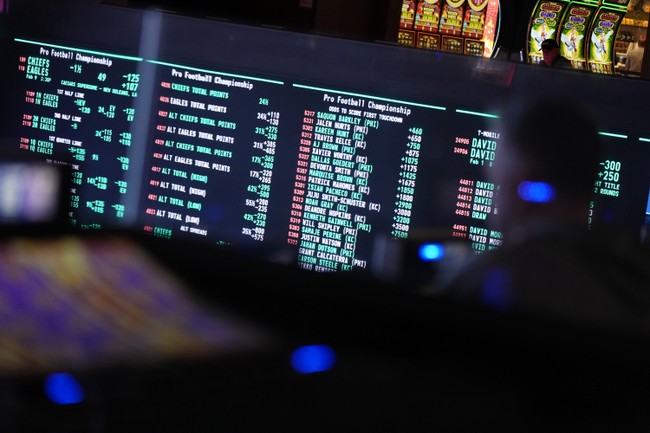
I’ll go ahead and admit here that I’m not a gambler. I might buy a lottery ticket here and there, usually when the jackpot is too big to ignore. My biggest haul came when the Georgia Lottery was brand new during my college days; I scraped together change to buy a 50¢ Cash 3 ticket and won $40. Years ago, during a four-hour layover at the airport in Las Vegas, I played the slot machines out of boredom, but I quit when I lost $4.
I’m not too judgmental of others when it comes to gambling, even though I know it can be highly addictive and dangerous for people. I’m not crazy about it, however, and it’s not something I’m inclined to engage in; I guess I’d just rather blow my money on other things.
Gambling is a big deal when it comes to sporting events these days. The Kentucky Derby took place on Saturday, but I missed it. I had attended a rally dinner that my congressman hosted, and I got home about five minutes after the race was over. There’s something magical about the Derby and its pageantry, but it’s also a big day for the Betting Industrial Complex.
“The total amount bet on the 2025 Kentucky Derby race set a new record at $234.4 million, surpassing the previous year’s record of $210.7 million,” Grok told me. “Additionally, all-sources wagering on the Kentucky Derby Day program reached a record $349.0 million, up from $320.5 million in 2024.”
Betting on horse racing is nothing new, but it reflects the changing moral view of gambling in general. I think of the episode of “Seinfeld” where Kramer wins big on a bet at Off Track Betting, and it’s a grimy establishment full of sketchy-looking people.
In a recent column at the Wall Street Journal, transplanted Kentuckian Caroline Aiken Koster explains how gambling on the Derby used to be much more subtle (and maybe even more playful):
Nothing seemed amiss when, as president of the Kentuckians of New York, I approved of putting this line on Saturday’s Kentucky Derby party invitation: “Hats, bow ties and bring $10 for the Derby hat winner!”
No one over 40 in our burgoo of Big Apple Kentuckians made inquiries. By contrast, Gen Z members clutched their bonnets:
“Ten bucks? Who’s judging, Kate Middleton?” a recent transplant quipped. “Colts competing with fillies in headwear? Seems unfair,” another snarked. I’m tickled as mint in mud, since there’s no pricey hat competition. Old-timers know the line is code. Translation: “$10 for a party bet.”
There was a time when gambling had a totally different face. There was a marked contrast between the smoke-filled poker nights or dingy casinos and the cheerful parties where pools and pass-the-hat betting were part of the fun, even if it wasn’t always on the up-and-up.
Related: Betting on the Next Pope? You Might Have a Gambling Problem.
Gambling looked different back in the day because most people thought of it as morally questionable. Polite people didn’t openly gamble, so it took on those underground forms. Times changed, and so did the morality of gambling.
“One generation, even in a place where there’s so much focus on horse racing, even here, betting was considered a morally suspect category,” Dr. Albert Mohler, a Kentucky resident, commented on Koster’s column. “Gambling as a moral issue was taboo, but in a relatively short amount of time, all that turned around. Lots of things factored into that.”
I would say that the shift started with education lotteries. State lotteries made gambling look like an altruistic activity. What’s wrong with a little betting when it’s for the children and the hardworking college kids?
Casinos moved from hazy and suspicious (except in Vegas) to sunny, exciting resorts offering the best in entertainment and accommodations. Gambling has woven itself into every sporting event and the coverage of sports. ESPN offers betting odds and stats on the bottom line and carries gambling-centric programming. Heck, ESPN even has its own betting platform.
Technology has evolved to make gambling ubiquitous. Betting apps make it too easy for people to gamble on anything these days. The corollary to that truth is that it’s also easier for people to ensnare themselves in gambling addictions, too. Placing a bet on an app can make even a winning bet lonely and cold, and the apps may make people who become addicted suffer in silence.
Again, I’m not going to judge somebody if he chooses to gamble responsibly. But our culture isn’t better off because gambling is so morally acceptable.
Here at PJ Media, we write a lot about truth — whether it’s the truth about what’s going on in the halls of power or timeless, eternal truth like Christianity. You can help us in our mission to report all kinds of truth by becoming a PJ Media VIP. Our members have access to exclusive content, podcasts, the comments section, and an ad-free experience; plus, PJ Media VIPs are investing in solid, truthful, conservative reporting.
There’s never been a better time to become a VIP because you can get 60% off when you use the code FIGHT.












